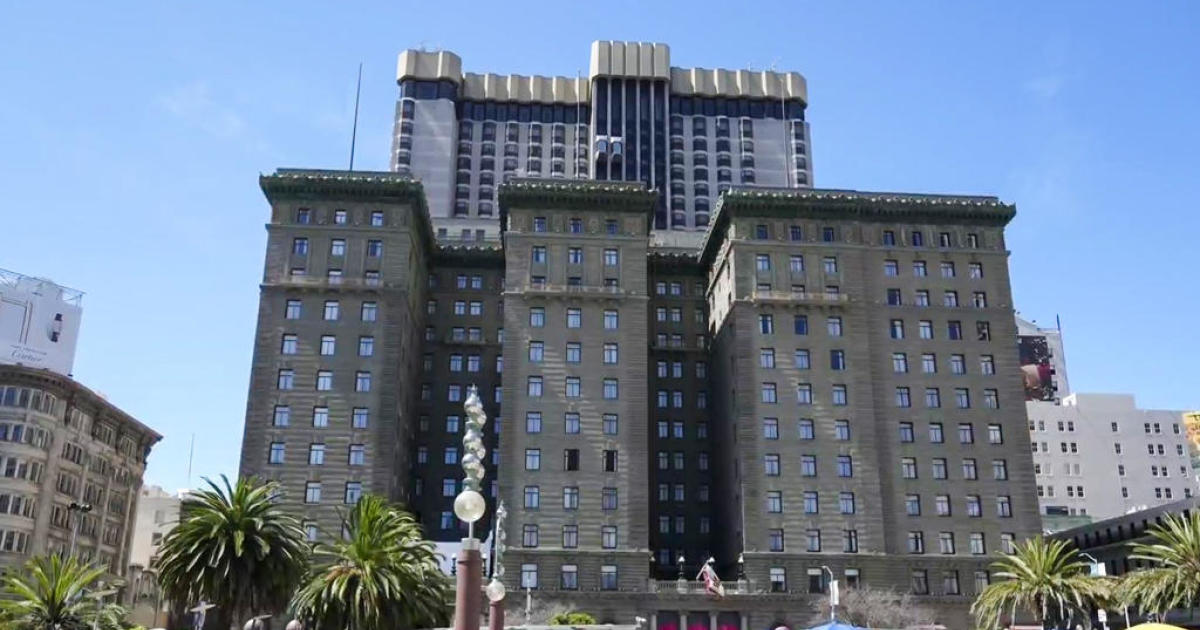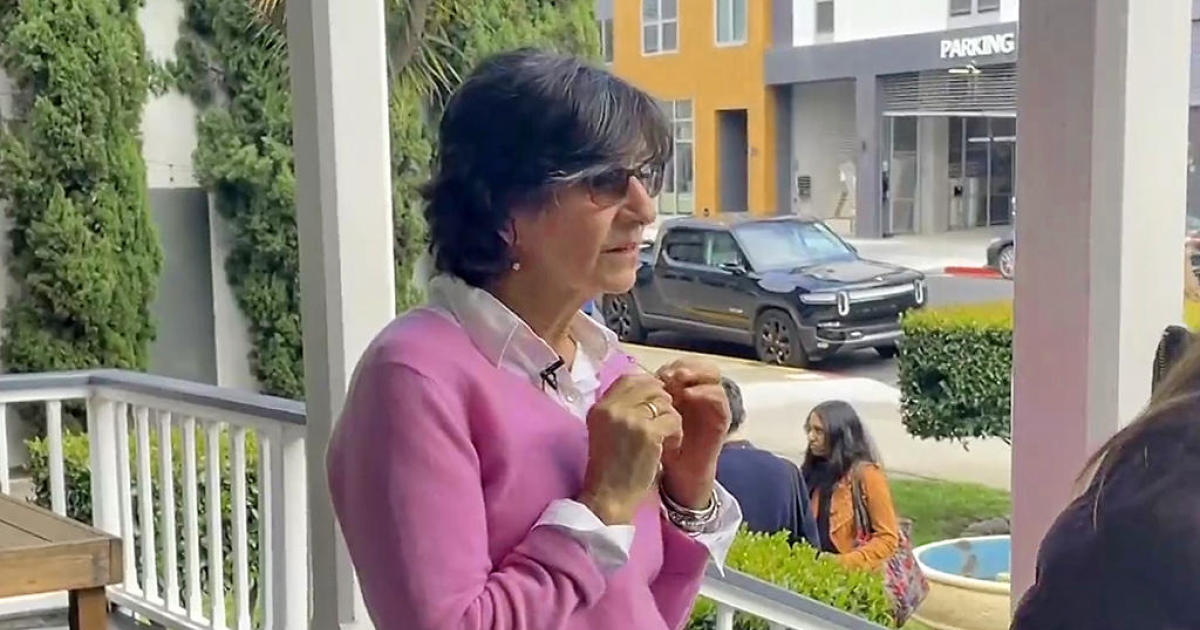Will San Francisco's downtown shake off the pandemic blues?
SAN FRANCISCO -- The downtown stores and businesses play a critical role in driving San Francisco economy, but they have been slow in rebounding from the pandemic blues.
It's not a scenario shared by many downtowns across the country.
Dr. Karen Chapple is a professor emerita at UC Berkeley and Director of the School of Cities at the University of Toronto. She and a team of researchers are conducting the "Urban Displacement Project," which tracks how much activity is happening in downtown areas. They analyze cell phone data, not just office vacancy rates, to compare recent population patterns to pre-pandemic numbers.
"We're looking at everybody who comes downtown," she said. "If you have the right mix of sectors, you're doing pretty well right now. But if you were too specialized, you might be suffering."
Of the 62 cities they've been tracking, San Francisco has ranked consistently at the bottom of the list when it comes to recovery.
"San Francisco, March 16, 2020, was at 30% of its pre-pandemic activity. March 2022, November 2022, still at 30% of its pre-pandemic activity," she said.
One reason Chapple points to is San Francisco's heavy reliance on the tech industry, whose workers went largely remote at the start of the pandemic and haven't made a robust return.
Jeffrey Woo, who owns Il Canto Café in San Francisco's Financial District, has had to change up his business model in order to adapt.
He took over the breakfast and lunch spot a few months before the pandemic with a plan of catering to the office crowd in the FiDi
"That was the plan," he said. "It was pretty busy then. Now, it's a different crowd."
Woo gets some in-person business, but says he's pivoted to a lot of online and delivery app orders.
"It's gotten a lot better, but it's taking a long time," he said.
According to a CBS News analysis of San Francisco job trend data from the U.S. Bureau of Economic Analysis, from 2019-2021:
-- Jobs in accommodation and food services saw a decrease of 41%
-- Jobs in wholesale trade saw a decrease of 25%
-- Jobs in utilities saw an increase of 11%
-- Jobs in information saw an increase of 9%
As she looked at a chart that shows the project's data, Chapple described San Francisco as 'stuck.'
CBS News Bay Area asked Mayor London Breed if she agrees with that assessment.
"San Francisco is not stuck. San Francisco is just different," she said.
Breed recently announced her "Roadmap to Downtown San Francisco's Future," which is comprised of 9 strategies and nearly 50 initiatives.
These are the strategies, according to the plan:
1. Ensure Downtown is clean, safe, and inviting.
2. Attract and retain a diverse range of industries and employers
3. Facilitate new uses and flexibility in buildings
4. Make it easier to start and grow a business
5. Grow and prepare our workforce
6. Transform Downtown into a leading arts, culture, and nightlife destination
7. Enhance public spaces to showcase Downtown
8. Invest in transportation connections
9. Tell our story
"I think that it is important to make sure that there is a layered approach. There's not a one thing that's going to bring our downtown back, it's going to be a number of things," Breed said. "And we of course need our legislative branch, the Board of Supervisors, to be a partner in these efforts. So, we have been working with members of the board, working with folks in the business community, coming up with solutions and strategies."
Among the steps are tax breaks and initiatives, with a goal of incentivizing businesses to stay here and to come here.
"Part of what I am pushing for in some of my tax initiatives is for some of the existing businesses to delay the change in the gross receipts tax so that people's taxes aren't doubling by June of this year," Breed said. "We're pushing that off for another two years to try and get businesses to be motivated about sticking with us, working with us, and continuing in San Francisco."
"But for those new businesses, we're saying look, you come to San Francisco - three years. Three years, you won't have to pay city taxes in order to get started and to get going and to grow your company. That's a way to get new companies interested and to help with a lot of the new startups and the various businesses that want to grow and thrive in our city."
Another part of her plan includes changing downtown zoning to make it easier to convert office space to housing.
"So, we've re-zoned the entire downtown area so that now the opportunity to convert without going through a lengthy one to even two-year process to change the use of a space," Breed said. "You can automatically do it through an easier process that'll take less time. That's not to say it'll happen automatically, but it's just an easier adjustment that's less time consuming."
The biggest challenge right now, Breed said, is public safety.
"We know that is a struggle, and we know that we need more officers, because we're short a little bit over 500 police officers, not to mention the people who are leaving the department to go to other places as well as the folks who are retiring," she said. "So, we have to do something aggressive around public safety to get things to a better place."
Another major challenge she acknowledged?
"The other thing that's very challenging, of course, is cleanliness and street conditions in certain parts of the city, where people are just frustrated," she said. "We spend a lot of resources in cleaning up those areas. You can clean up the entire Tenderloin in the morning, where those teams are out there, and then before 12:00, it would look like nothing ever even happened."
"So, we have to deal with not just the people that we have out there cleaning the streets, but the behavior and the challenges with the folks who create the problem in the first place."
We asked Breed what roadblocks she anticipates running into as she tries to accomplish her roadmap.
"Well, I mean the Board of Supervisors is - some of them can be quite challenging and this is going to be a really heavy overhaul," she said. "For example, I introduced a budget supplemental to the Board of Supervisors for $27.6 million to cover police, and it's for overtime, but overtime to cover the bases."
"We have stations that are not at capacity, so in order to make sure that we are still filing those shifts, we have to use overtime in order to meet the basic needs of our city. We have some members of the board who under no circumstances will vote to support something like this."
Despite the challenges, Breed is optimistic about the future of San Francisco.
"We're moving forward, we're being aggressive, and we're going to make the city even better than ever," she said.
Back at Il Canto Café, Woo says if the situation downtown doesn't truly improve, he's not sure he'll be able to stay in business there.
"If I start hearing the occupancy rate going down to 10%, 5%, then we'll get pretty worried and we'll have to relocate somewhere else," he said.
However, he has no plans on leaving San Francisco.
"I was raised here, been here since I was 4 years old," he said. "This is the place to be."



